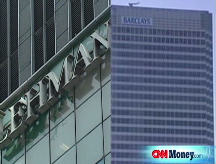|
| ||||||
Billionaire investor Warren E. Buffett said this morning that his investment of $5 billion in Goldman Sachs reflects a bet that Congress will approve the Bush administration's proposed financial rescue plan -- and that he would otherwise be preparing for possible gridlock in the economy.
"If I did not think the government was going to act I would not be doing anything this week. I might be trying to undo things," Buffett said in an interview on CNBC. "I am betting that the government is going to do the rational thing. It would be a mistake to do anything if the government was going to walk away from the . . . proposal [by Treasury Secretary Henry M. Paulson Jr.]. There is just no telling what would happen."
Calling the current situation an "economic Pearl Harbor," Buffett said that recent events brought the United States "very close to a system that was dysfunctional, that would have gummed up the economy in a way that would have taken years and years," to resolve.
Action on the Paulson plan "is absolutely necessary to avoid going over the precipice."
The administration's plan to buy troubled mortgage loans from banks and financial companies heads for its second day of hearings on Capitol Hill today, amid both widespread criticism of its terms and an underlying sense among lawmakers that something needs to be done to prevent financial markets from locking up entirely. Paulson has proposed spending up to $700 billion buying troubled mortgage loans and related securities from banks and financial companies, clearing from their books a problem that has clogged markets around the world.
President Bush, in New York, said he remained confident that the "give-and-take" of the legislative process would produce a strong plan to respond to the financial crisis.
"I am confident that when it's all said and done, there will be a robust plan. And there needs to be," Bush said.
The price tag of the current plan in particular has sparked a backlash among lawmakers who say their constituents are outraged at the idea of rescuing Wall Street executives who mismanaged their businesses.
Though Buffett said his investment in Goldman was not timed to influence the debate, he made his position clear: that the government needs to act in a matter of days, not weeks, or the problems will get worse, potentially damaging the ability of businesses to obtain the money they need to operate. Rather than costing taxpayers, Buffett said, the rescue plan -- if handled correctly -- should turn a profit as the federal government buys troubled assets at a steep discount.
"It should be a lead pipe cinch to make 10 percent at the type of prices that exist now," Buffett said. "The government is getting $700 billion of assets at what I regard as attractive prices. . . . If I could borrow $700 billion at the government's terms, I'd be doing this."
Buffett's investment in Goldman Sachs, restructured this week as a bank-holding company, represents a major vote of confidence in the battered financial system from one of the country's most respected investors. U.S. markets were up slightly when trading opened this morning.
Buffett has long touted the value of investing in well-known brand names such as Coca-Cola and Kraft because they can charge premium prices for their products and services. Goldman Sachs is no exception.
'Business' 카테고리의 다른 글
| Talks Falter on Bailout Deal (0) | 2008.09.26 |
|---|---|
| Bush Calls Bailout Vital to Economy, Will Meet With McCain and Obama (0) | 2008.09.26 |
| Bernanke Tells Congress That U.S. Economy Is Faltering (0) | 2008.09.25 |
| Dow Up in Morning Trading as Policymakers Testify on Bailout (0) | 2008.09.24 |
| Policymakers: Congress Must Move Quickly to Avert Damage (0) | 2008.09.24 |













